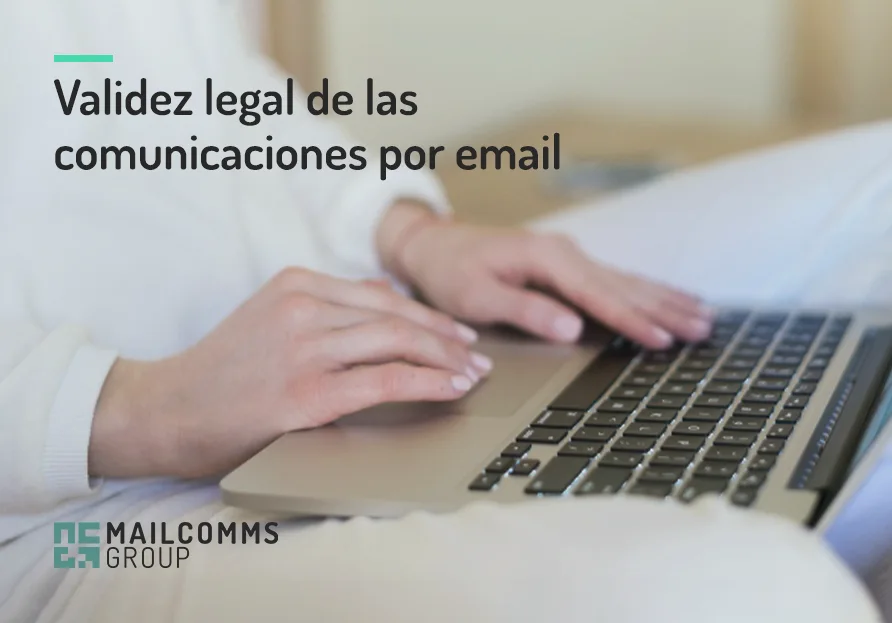El correo electrónico es una herramienta de uso habitual en el ámbito empresarial y personal. Sin embargo, cuando se trata de acuerdos formales o procedimientos judiciales, surge la pregunta: ¿cuál es la validez de las comunicaciones por correo electrónico a nivel legal? Esto va a depender de varios factores.
Te invitamos a descubrir si un email tiene validez legal y todas las condiciones para que esto se cumpla.
Contenidos relacionados:
> Beneficios del uso del email certificado en el sector financiero.
> La importancia del email certificado en el sector legal: garantía de validez jurídica.
¿Un email tiene validez legal?
La respuesta puede ser sí, pero con condiciones. Un correo electrónico tiene validez legal siempre y cuando cumpla con ciertos requisitos que aseguren su autenticidad y fiabilidad. De hecho, a veces es altamente recomendable el uso de email certificado por parte de las empresas.
Con el avance de la tecnología, los correos electrónicos pueden ser considerados prueba válida en tribunales, pero deben contar con mecanismos de verificación adecuados.
Te proponemos, además, este otro contenido en nuestro blog sobre el valor probatorio en juicios de los correos electrónicos certificados.
Factores que determinan la validez legal de un email
To ensure the legal validity of an email, there are certain essential criteria to be met.
Contenido del email
As with any message, the validity of e-mail communications will depend, in part, on the text being clear and consistent with the purpose of the communication. In addition to this, the content must be verified. Or even if the content of the message has been modified, this is known as document integrity.
Trazabilidad y registro
The traceability of a mail is another fundamental factor. This implies that it can be verified when and by whom it was sent and received. An email is legally valid if it can be registered and audited .
Identidad del remitente y destinatario
Es importante que tanto el remitente como el destinatario estén correctamente identificados en el correo electrónico. Sin métodos de autenticación, la validez legal del mensaje podría ser cuestionada, ya que existe el riesgo de suplantación de identidad.
Por tanto, en caso de aportar una prueba en juicio, deben de quedar reducida cualquier duda que haga pensar sobre la trazabilidad e integridad del contenido. Para disipar este riesgo es preciso contar con… Soluciones que aumentan.

Soluciones que aumentan la validez legal de un email
If you use email as a communication channel with your clients and collaborators, there are several tools that improve the validity of email communications, helping to guarantee their authenticity in the legal field.
Email certificado
The certified email is the tool that guarantees the veracity and full justification of the message. Using this service, you have a reliable proof that ensures the delivery, reception and content of the mail. The service of certified email MailComms Group’s certified email service provides the legal validity required for these communications.
Firmas electrónicas
An advanced electronic signature provides additional validation to an e-mail. This ensures that the content has not been altered and that the sender is who they say they are. With the electronic signature from MailComms Group you will have an efficient way to guarantee the legal validity of an email.
Sistemas de archivo y auditoría
Maintaining an email archiving and auditing system can be useful to preserve the legal validity of an email. These systems allow emails to be recorded and stored securely, facilitating their consultation in case they are needed in a legal proceeding.
Ventajas de usar comunicaciones electrónicas con validez legal
Las comunicaciones electrónicas con validez legal ofrecen numerosas ventajas frente a los métodos tradicionales.
Rapidez y eficiencia en la gestión de documentos legales
Enviar un correo electrónico certificado, el cual tiene validez legal por cumplir los requisitos para ello, permite gestionar documentos legales rápidamente, eliminando las demoras asociadas con el correo postal o la documentación física. También es un medio adecuado para otras acciones, como reclamar una factura impagada. Esto facilita la toma de decisiones y la resolución de trámites en menos tiempo.
→ Descubre nuestro artículo sobre cómo enviar un email certificado.
→ Y conoce más sobre la capacidad del email certificado para automatizar las notificaciones legales de las empresas.
Reducción de costes frente a métodos tradicionales
El uso de comunicaciones electrónicas válidas legalmente también reduce costes. No es necesario imprimir ni enviar físicamente documentos, lo que se traduce en un ahorro significativo para las empresas.
Esto no solo lo vemos con el email, sino también con otro tipo de comunicaciones como el SMS certificado.
Registro digital como prueba ante disputas legales
Uno de los mayores beneficios de las comunicaciones electrónicas validadas a nivel legal es la capacidad de registrar digitalmente las conversaciones, lo que puede ser crucial en caso de disputas legales. Un ejemplo claro es el uso del correo electrónico certificado en el sector seguros.
Además, esto no solo se da cuando un email tiene validez legal, sino también con otros canales, como el WhatsApp certificado.
Limitaciones de las comunicaciones electrónicas en el ámbito legal
Despite their obvious advantages, electronic communications have some legal limitations.
Casos en los que un email no es suficiente como prueba legal
Un correo electrónico no siempre será suficiente como prueba legal. En algunos casos, como en documentos notariales o ciertos contratos, es necesario seguir procedimientos formales más estrictos que un correo electrónico no puede suplir, pero otros medios sí, como puede ser el burofax online.
Problemas de seguridad y riesgos de suplantación de identidad
Los correos electrónicos pueden ser vulnerables a ataques de hackers o suplantación de identidad. Esto puede poner en riesgo la validez de las comunicaciones por correo electrónico si no se emplean las herramientas adecuadas para proteger la seguridad del mensaje y verificar la identidad de remitente y destinatario.

¿Cómo garantizar la validez legal de un correo electrónico?
Para asegurarse de que un correo electrónico tiene validez legal, es importante seguir ciertas recomendaciones.
Usa servicios de email certificado
One of the most effective ways to ensure the validity of email communications is to use certified email services. These platforms allow you to verify the authenticity and integrity of the message, such as the certified email service or any of the certified notifications from MailComms Group.
Aplica la firma electrónica avanzada
Apply an advanced advanced electronic signature to an e-mail reinforces its legal validity by confirming the sender’s identity.
Mantén un registro seguro de las comunicaciones
It is essential to keep a secure record of all electronic communications. An orderly and accessible archive can be decisive in legal proceedings if the authenticity of a message needs to be proven.
Evita modificaciones posteriores al envío
En general, los emails certificados no permiten las modificaciones posteriores al envío. No obstante, en caso de estar permitido, lo recomendable es evitar cualquier cambio, ya que las alteraciones posteriores pueden invalidar la prueba legal del mensaje.
Si quieres garantizar la validez legal de tus comunicaciones empresariales, contacta con MailComms Group para conocer todas las posibilidades. ¡Asegura que tus mensajes lleguen con confianza, seguridad y respaldo jurídico!
Preguntas frecuentes
¿Para qué sirve enviar un email certificado con validez legal?
The legal validity of a certified email guarantees that the content, sending and receipt of an email has been verified, which makes it a valid legal proof.
¿Un correo electrónico tiene validez legal en cualquier situación?
Not necessarily. An e-mail is legally valid only if it meets certain authentication, traceability and security requirements.
¿Un email sin firma electrónica tiene validez legal?
In some cases, an e-mail can be valid without including any of the following types of types of electronic signature, but adding an advanced electronic signature provides an extra layer of security and authenticity.
¿Qué debo hacer para asegurar la validez legal de un email importante?
To ensure the validity of email communications, use reliable certified email services such as MailComms Group. In addition to this, apply an advanced electronic signature and keep a secure record of the communication.
¿Cuándo es válida una notificación por correo electrónico?
An e-mail notification is legally valid when it complies with the requirements established for it, such as the use of certified e-mail or electronic signature.
¿Qué normativa regula el uso de los emails certificado?
Sending certified email is one of the services described in Regulation No. 910/2014 (eIDAS), as amended by Regulation (EU) 2024/1183 of the European Parliament and of the Council of 11 April 2024 (eIDAS 2).
